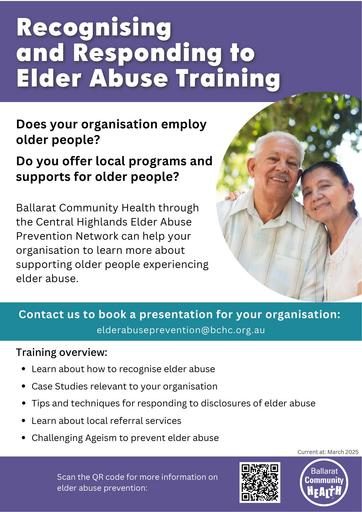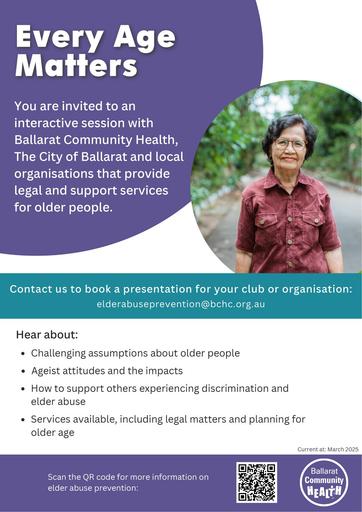Elder Abuse Prevention
Elder abuse is any mistreatment of an older person by another person with whom they have a relationship of trust. Often that person is a family member or carer, but could also be a friend or neighbour who they depend upon.
The abuse can be financial, psychological, emotional, physical or sexual, or could involve social isolation or neglect of the older person.
Contact
If you’re interested in booking a session or presentation on Elder Abuse for your organisation, club or group you can make an email enquiry.
email [email protected]
In May 2017 the Victorian Government launched the ‘Free from violence strategy’ to prevent family violence and all forms of violence against women. Although the strategy is primarily focused on violence against women, it acknowledges that elder abuse affects both older men and women, can be perpetrated by both men and women with whom the older person has formed a relationship of trust, such as a son, daughter, close friend or partner. It is through this strategy that Ballarat Community Health received funding from the Department of Health and Human Services (DHHS) for a project to coordinate a regional Elder Abuse Prevention Network.
The Central Highlands Elder Abuse Prevention Network (CHEAPN) aims to reduce the incidence of elder abuse in the Central Highlands region. It achieves this by further expanding the CHEAPN and supporting organisations and community groups in primary prevention activities to stop elder abuse before it starts, in line with the Victorian Government’s ‘Free from violence’ strategy. The network targets six local government areas in the Central Highlands and Grampians region (Ararat, Ballarat Golden Plains, Hepburn, Moorabool and Pyrenees).
The project is supported by the peak body Seniors Rights Victoria, which provides information, support, advice and education to help prevent elder abuse and safeguard the rights, dignity and independence of older people. Seniors Rights Victoria also provides leadership on policy and law reform and works with other organisations to raise awareness of elder abuse.
The network includes over 30 organisations and community groups that have committed to taking action against elder abuse.
Prevention of elder abuse is important given the rising number of older people in Australia, lack of reporting, difficulty in resolving problems once they happen and damage to family relationships that can occur.
Tackling the drivers of elder abuse requires addressing ageism and other forms of potential disadvantage, such as cultural and linguistic difference, disability, racism and sexual orientation, as well as gender equality.
- Talk to the person you are concerned about. Invite them to talk in a place where they are alone and safe.
- Listen to the person. Offer them your time and your support and respect their right to make their own decisions.
- Remind them they are not to blame and that everyone has the right to live in safety and be treated with dignity and respect.
- Let them know that help is available and offer to assist them in getting the necessary support if and when they are ready to do so.
- Encourage them to call Seniors Rights Victoria on 1300 368 821 for advice and assistance. If they are unable to call but you know they want to speak to someone, you can call on their behalf and Seniors Rights Victoria will arrange a way to speak to them by phone, at their offices or, if necessary, at the older person’s home.
- Continue to offer support and encouragement even if the person is not ready to accept help at this point in time.
If there is an immediate risk of physical harm or damage to the older person’s property call the police on 000.
The police can help in a number of ways, including removing the abuser and/or applying for an Intervention Order on the older person’s behalf. This is a court document that will help protect the older person against further violence.
Interactive sessions for your club or organisation
Recognising and Responding Training
A training presentation for organisations that employ older people or offer local programs and supports for older people.
Challenging Ageism
A presentation for clubs and groups to challenge the stereotypes about older people and how we think about ageing.
Every Age Matters
An interactive session with Ballarat Community Health, the City of Ballarat and local organisations.
Resources
If you believe you or someone you know are experiencing elder abuse, your GP, or any of these resources can help and provide advice.
pdf Central Highlands Elder Abuse Prevention Network Disclosure Guidelines
In Community Programs 403 downloads

These guidelines will provide support for handling disclosures that may occur while undertakingactivities that contribute to the work of the Central Highlands Elder Abuse Prevention Network(CHEAPN). It focuses on disclosures that relate to older people’s health and wellbeing, in particularexperiences of violence against older people.



